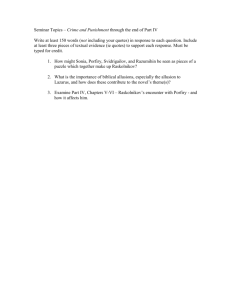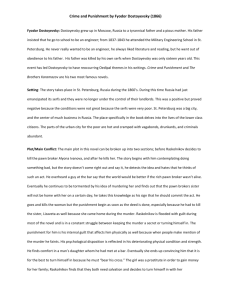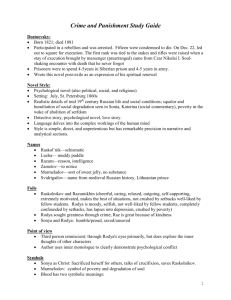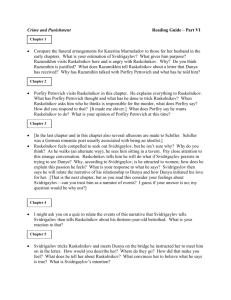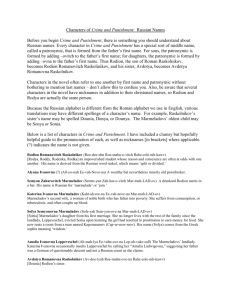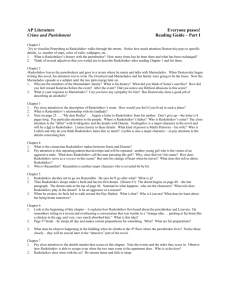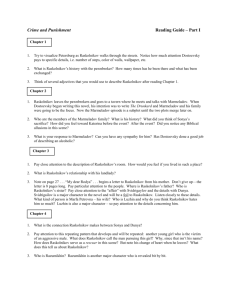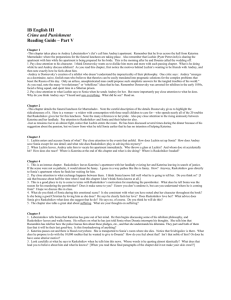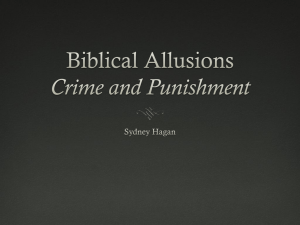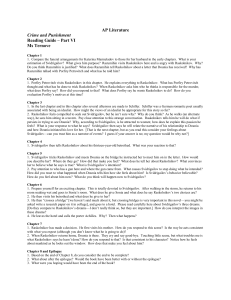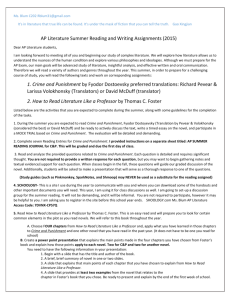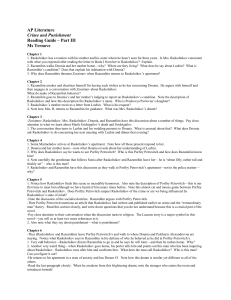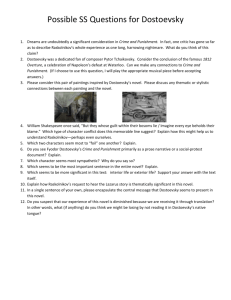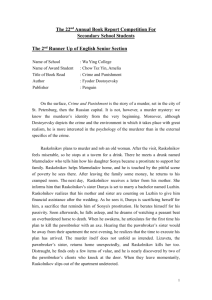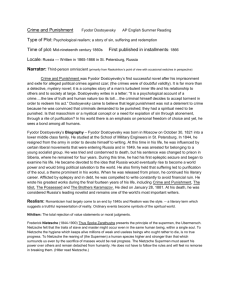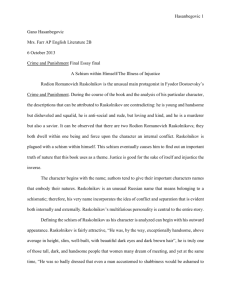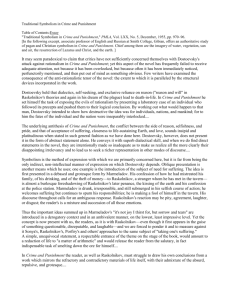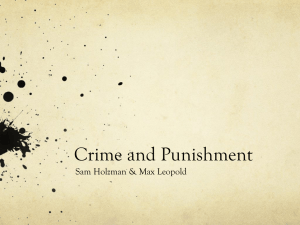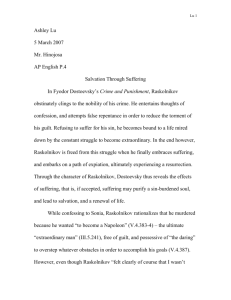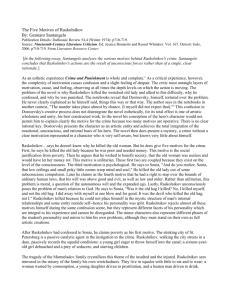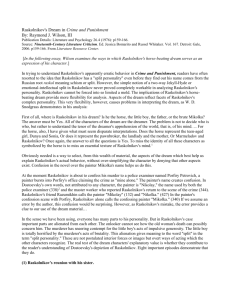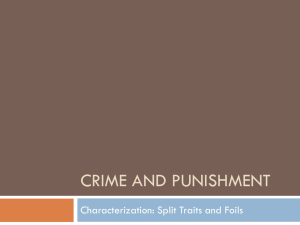Crime and Punishment Questions
advertisement
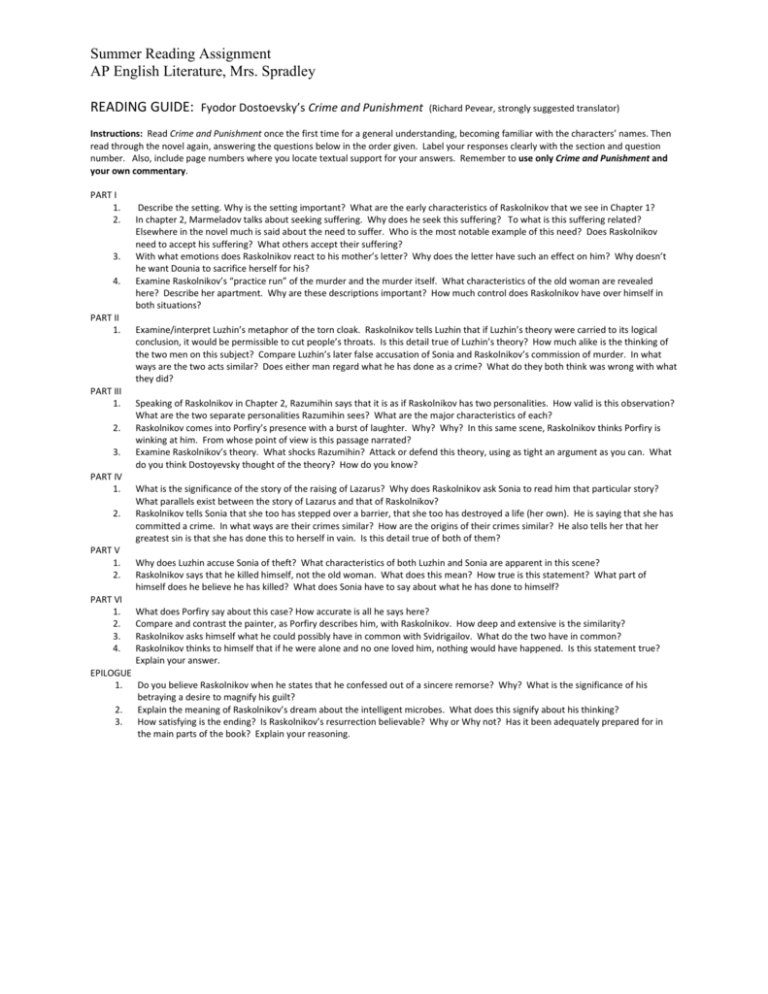
Summer Reading Assignment AP English Literature, Mrs. Spradley READING GUIDE: Fyodor Dostoevsky’s Crime and Punishment (Richard Pevear, strongly suggested translator) Instructions: Read Crime and Punishment once the first time for a general understanding, becoming familiar with the characters’ names. Then read through the novel again, answering the questions below in the order given. Label your responses clearly with the section and question number. Also, include page numbers where you locate textual support for your answers. Remember to use only Crime and Punishment and your own commentary. PART I 1. 2. 3. 4. PART II 1. PART III 1. 2. 3. PART IV 1. 2. PART V 1. 2. PART VI 1. 2. 3. 4. Describe the setting. Why is the setting important? What are the early characteristics of Raskolnikov that we see in Chapter 1? In chapter 2, Marmeladov talks about seeking suffering. Why does he seek this suffering? To what is this suffering related? Elsewhere in the novel much is said about the need to suffer. Who is the most notable example of this need? Does Raskolnikov need to accept his suffering? What others accept their suffering? With what emotions does Raskolnikov react to his mother’s letter? Why does the letter have such an effect on him? Why doesn’t he want Dounia to sacrifice herself for his? Examine Raskolnikov’s “practice run” of the murder and the murder itself. What characteristics of the old woman are revealed here? Describe her apartment. Why are these descriptions important? How much control does Raskolnikov have over himself in both situations? Examine/interpret Luzhin’s metaphor of the torn cloak. Raskolnikov tells Luzhin that if Luzhin’s theory were carried to its logical conclusion, it would be permissible to cut people’s throats. Is this detail true of Luzhin’s theory? How much alike is the thinking of the two men on this subject? Compare Luzhin’s later false accusation of Sonia and Raskolnikov’s commission of murder. In what ways are the two acts similar? Does either man regard what he has done as a crime? What do they both think was wrong with what they did? Speaking of Raskolnikov in Chapter 2, Razumihin says that it is as if Raskolnikov has two personalities. How valid is this observation? What are the two separate personalities Razumihin sees? What are the major characteristics of each? Raskolnikov comes into Porfiry’s presence with a burst of laughter. Why? Why? In this same scene, Raskolnikov thinks Porfiry is winking at him. From whose point of view is this passage narrated? Examine Raskolnikov’s theory. What shocks Razumihin? Attack or defend this theory, using as tight an argument as you can. What do you think Dostoyevsky thought of the theory? How do you know? What is the significance of the story of the raising of Lazarus? Why does Raskolnikov ask Sonia to read him that particular story? What parallels exist between the story of Lazarus and that of Raskolnikov? Raskolnikov tells Sonia that she too has stepped over a barrier, that she too has destroyed a life (her own). He is saying that she has committed a crime. In what ways are their crimes similar? How are the origins of their crimes similar? He also tells her that her greatest sin is that she has done this to herself in vain. Is this detail true of both of them? Why does Luzhin accuse Sonia of theft? What characteristics of both Luzhin and Sonia are apparent in this scene? Raskolnikov says that he killed himself, not the old woman. What does this mean? How true is this statement? What part of himself does he believe he has killed? What does Sonia have to say about what he has done to himself? What does Porfiry say about this case? How accurate is all he says here? Compare and contrast the painter, as Porfiry describes him, with Raskolnikov. How deep and extensive is the similarity? Raskolnikov asks himself what he could possibly have in common with Svidrigailov. What do the two have in common? Raskolnikov thinks to himself that if he were alone and no one loved him, nothing would have happened. Is this statement true? Explain your answer. EPILOGUE 1. Do you believe Raskolnikov when he states that he confessed out of a sincere remorse? Why? What is the significance of his betraying a desire to magnify his guilt? 2. Explain the meaning of Raskolnikov’s dream about the intelligent microbes. What does this signify about his thinking? 3. How satisfying is the ending? Is Raskolnikov’s resurrection believable? Why or Why not? Has it been adequately prepared for in the main parts of the book? Explain your reasoning.
